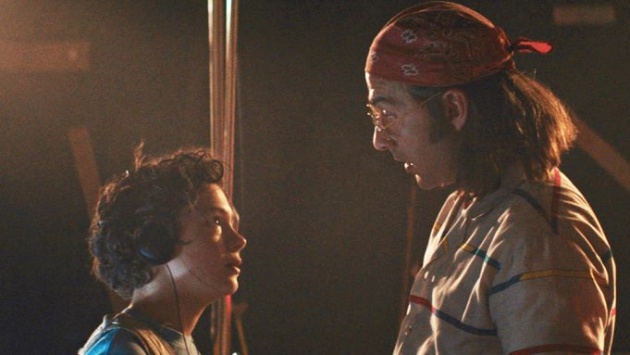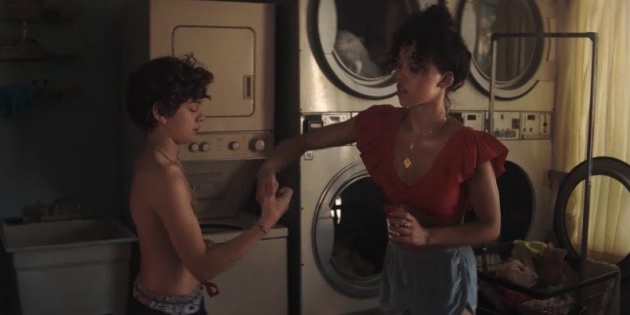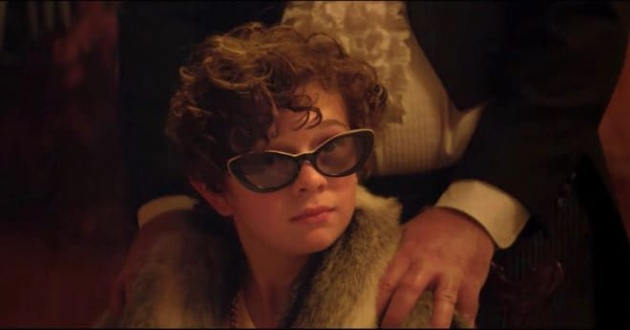
Pictured: Otis Lort (Noah Jupe) and his father James (Shia LaBeouf) in a scene from the film 'Honey Boy', written by LaBeouf and directed by Alma Har'el. Still courtesy of Amazon Studios (US) / Sony Pictures Europe (UK)
Honey Boy is a ninety-minute ‘cry from the heart’ written by and starring Shia LaBeouf, who made the transition from child actor to juvenile lead with more than a little help from Steven Spielberg, who produced the Transformers films and cast him as Indiana Jones’ son in Indiana Jones and the Kingdom of the Crystal Skull. While not exactly a bankable star, LaBeouf suddenly (from the outside at least) succumbed to substance abuse. Now in his thirties, he is an unsettling presence. You feel complicit in his unhappiness, sorry that you ever enjoyed the first three Transformers films (though the first one is pretty good) and films such as Disturbia and Eagle Eye. Like fellow child star turned anti-Hollywood lead, Joaquin Phoenix, LaBeouf is plunging into the dark side, only it isn’t exactly clear that he will find some sort of equilibrium. You like to think actors are in control of their performance, because anything else would be unhealthy. I’m not sure if LaBeouf knows where he wants to go. Every time he is cast, it feels like a form of exploitation.
LaBeouf’s counsellor is the film’s director Alma Har’el. During an extended therapy session, LaBeouf wrote out his trauma in a screenplay form. He sent it to Har’el who encouraged him to develop it. The result is a film in which LaBeouf plays a version of his own father, here called James Lort. Mishearing it, I thought he said Tort – like torte cake. Cake, or pie is very important in the Lort household. Both father and son took pies in the face – the film’s poster shows LaBeouf’s twelve-year old surrogate, Otis Lort (Noah Jupe), with his face covered in cream pie, hair tousled. The more common meaning of tort is ‘a wrongful act or infringement of a right (other than under contract) leading to legal liability’. Otis undoubtedly has his right (to a happy childhood) infringed. His father doesn’t like being displaced by the Mexican American minder Tom (Clifton Collins, Jr), who has been court ordered to look after him through the Big Brother programme. Otis invites Tom for a barbecue at the trailer park where he and Otis live, then tosses his burger on a plate and Tom in the pool.
James was a circus clown and an ex-service man, who has been classified as a sex pest after a woman had to escape his grasp by leaping from a moving car. He is separated from his wife (Natasha Lyonne, heard only as a voice on the phone). However, given his lack of employment opportunities, he is well-placed to look after his young son, who has followed him into show business, as it were. Somehow, Otis became a child star. His father effectively works for him, making sure he gets to set on time. From the scenes that we see, Otis is self-reliant, diligently learning his lines and handing over his per diem to his dad with the confidence that there is more to come. James hates working for his son. He aches with inadequacy and self-loathing even as he tries to convince Otis that he has his best interest at heart.
The story is told from the perspective of 22-year old Otis Lort (Lucas Hedges) who we first see on the set of a big blockbuster. Otis reacts to something we don’t see. He holds up his palm and shouts, ‘no, no, no, no, no, no’ before he is blasted backwards into a section of a burnt-out aeroplane. As the smoke clears, we see he is on a harness. Otis is entirely passive as he is lowered down and released from the harness, led towards us by an assistant who looks like LaBeouf with a beard. The reference appears to be to a Transformers movie, Hedges re-enacting LaBeouf as a meme. The silence afterwards is a reminder that Otis is just giving a performance. The real Otis is unknowable.
Har’el appears to blow much of her production budget in the first five minutes of the film, not just on the Transformers homage but on a montage that blurs moviemaking and reality. We see Otis in a fight, drinking in his trailer, running down a tunnel in prison stripes with a child on his back, drinking even more, driving a car, the car’s hit from the side, Otis slammed onto a bonnet and cuffed screaming ‘what have I done to you?’ He ends up in a facility and paces up and down, reciting things in the room and snapping an elastic band against his wrist. He rails against his therapist (Laura San Giacomo). ‘You want to take away my pain, but without it I can’t work!’ Otis cries. ‘Can I?’ the therapist asks, partly wondering whether she has the power to do this, partly asking for Otis’ approval. Someone here (LaBeouf, Har’el) forgets that ‘can’ is about ability and ‘may’ is about permission.
The film cuts between 1995 and 2005, both years signalled through fourth-wall breaking clapperboards. Pushing away balls of wool – Otis is expected to learn knitting as part of his rehabilitation (he resists a yarn – boom, boom) – Otis recalls his childhood, being picked up from the studio and leaning against his father on the motorcycle ride home, James pushing him away. James criticises the way his son pees (he uses an ethnic slur) and demonstrates the art of urinating soundly. He starts talking about Otis’ mother. ‘Why does she have to work? She wants you to fail. I’m here now, not filling you full of failure.’ The scene goes on longer than you might expect – James is waiting to have access to the laundry. This is because LaBeouf and Har’el aren’t setting up plot points, rather character ones. James encourages Otis to juggle balled socks. If he drops them three times, Otis must do ten push-ups. Otis asks his father if he can go to a game with a friend. ‘Who’s driving?’ ‘The friend.’ ‘He’s fourteen years old, he ain’t driving.’ Otis admits that Tom is taking them. James asks his son to invite Tom over, offering him cigarettes as an inducement. James permits his son to smoke, though not in front of people, in case they think he’s a (curse word) dad. ‘You’re not a (curse word) dad’, says Otis, repeating his father’s language.
The film is stylised. In an early scene, we see young Otis look up and watch television. James is in a clown outfit performing with his animal associate, Henrietta La Fowl, a performing chicken. It’s not quite the act that James described to a woman on set, whilst waiting for Otis. It shows James’ limited talent.
The 22-year old Otis is resistant to therapy. He shares a room and closes a sliding door so he can go pee. The sound of urine against porcelain recalls his childhood self, the image of himself that his father tried to instil. Otis won’t join in a self-hugging exercise that takes place in an outdoor pool. ‘You can do this anywhere,’ the group leader, Alec (Martin Starr) insists. ‘I can’t do it on the freeway,’ Otis retorts. At one point, Alec tells him to go for a walk in the forest and shout as loud as he can. ‘Let me know how it went,’ he says, getting his tense wrong – he should have said, ‘let me how it goes’. The grammatical error is, I think, deliberate. There is no present tense in the film unlike in other movies. Only the past.
James doesn’t really get on with the other people on the housing compound. He gets upset by loud music. At one point, he stares lasciviously at a young black woman sitting outside and places his hand suggestively under the brake of his motorcycle. ‘Not you, daddy-o,’ the woman responds, averting her gaze as if knowing that he is a registered sex offender or, at the very least, trouble.

Pictured: Otis Lort (Noah Jupe) with the shy girl opposite (FKA Twigs) in 'Honey Boy', a drama with autobiographical elements written by Shia LaBeouf and directed by Alma Har'el. Still courtesy of Amazon Studios (US) / Sony Pictures Europe (UK)
In another scene that exists to show James’ frustration, Otis tells his mother that he has been offered a MOW – a Movie of the Week. Repeating what his mother asks so that James can hear, Otis asks whether his father can travel. ‘Why are you asking that?’ James asks. ‘Because of the court order,’ repeats Otis. ‘I mean, why are you asking that in front of him?’ James takes the receiver and curses down the phone. Otis does a good job conveying his mother’s tone – what can one say, he’s an actor. But James gets mad.
‘Why won’t you hold my hand?’ young Otis asks. ‘Because I don’t want them to think you’re a wuss.’ James is afraid of being judged as too close to his son. What other life does he have? He promised his son a treehouse but can’t deliver. He spends his time cultivating marijuana plants on the side of a freeway. This leads to the film’s only joke. ‘I’m growing,’ he tells his son. ‘I know,’ Otis says forgiving him. ‘I mean I’m growing marijuana.’ James responds.
The heart of the film is young Otis trying to reach out to his father, to share a moment with him, not just to mimic his cigarette habit. In a heart-breaking scene, we see Otis do this in character, as a spoilt boy wearing glasses and a fur being given a massage by a servant, Royston. The father (Graham Clark) it appears has two homes. The kid wants him to stay. ‘Of course, I’ll stay.’ The scene is trite. However, Otis’ performance is full of feeling, reflecting his hunger to connect with his dad. James meanwhile is attending Alcoholics Anonymous meetings with a palpable sense of grievance.
Scenes involving the 22-year old Otis are echoed by scenes with James. The most powerful moment occurs when young Otis berates his father and James hits him. ‘You can criticise your boss once, you can criticise him twice,’ James begins. James goes on a bender, drinking, showering a pole dancer with dollars, vomiting. He leaves his son on his own. The girl opposite (FKA Twigs) comforts him. Their scenes are silent. Otis is too young to have sex but accepts a cuddle. In an earlier scene, in which she shares his bed in a moment if tenderness, but without sex, Otis reaches into a drawer and gives her a handful of cash, an obscene way of commodifying emotion. The girl doesn’t talk about it, but later we see her wave to him through a window.
 Pictured: Child actor Otis (Noah Jupe) in character reaching out to his on-screen father (Graham Clark, not pictured) in 'Honey Boy', a drama with autobiographical elements written by Shia LaBeouf and directed by Alma Har'el. Still courtesy of Amazon Studios (US) / Sony Pictures Europe (UK)
Pictured: Child actor Otis (Noah Jupe) in character reaching out to his on-screen father (Graham Clark, not pictured) in 'Honey Boy', a drama with autobiographical elements written by Shia LaBeouf and directed by Alma Har'el. Still courtesy of Amazon Studios (US) / Sony Pictures Europe (UK)
Aside from on set, no one addresses Otis as a celebrity, even though he is briefly recognised. His father takes him off-set at one point because it is after his allotted hours, even though Otis is working his way into the scene. No one on set attempts to correct James’ behaviour either, at least as Otis remembers it.
The emotional range of the film is quite narrow, as Otis tries to accept who his father was. In a fantasy sequence he finds his father in the same motel apartment setting. ‘I’m going to make a movie about you,’ he explains in a fourth-wall breaking moment. ‘Make me look good,’ his father replies.
The film doesn’t resolve Otis’ trauma so much as extend so sympathy to James, or at least Shia LaBeouf’s perception of his own father. No one else is blamed for Otis’ sense of post-traumatic stress disorder – certainly not the TV company that employed him. The film offers a snapshot of pain. It is unlike a conventional Hollywood movie because there is no catharsis. It also says something about the lonely lot of a child actor. You wonder what Noah Jupe thought as he played the scenes of Otis’ unhappiness. Might he anticipate a trauma in years to come?
The lack of catharsis means that Honey Boy won’t be an awards contender. It is too self-enclosed to be feted by a large public. It feels honest – Shia LaBeouf’s attempt to hug himself. That it doesn’t try to universalise Otis’ pain is commendable. Sometimes Hollywood stars really do have it worse than the rest of us.
Reviewed at Cineworld West India Quay, Screen Six, East London, Wednesday 11 December 2019, 17:30 screening



